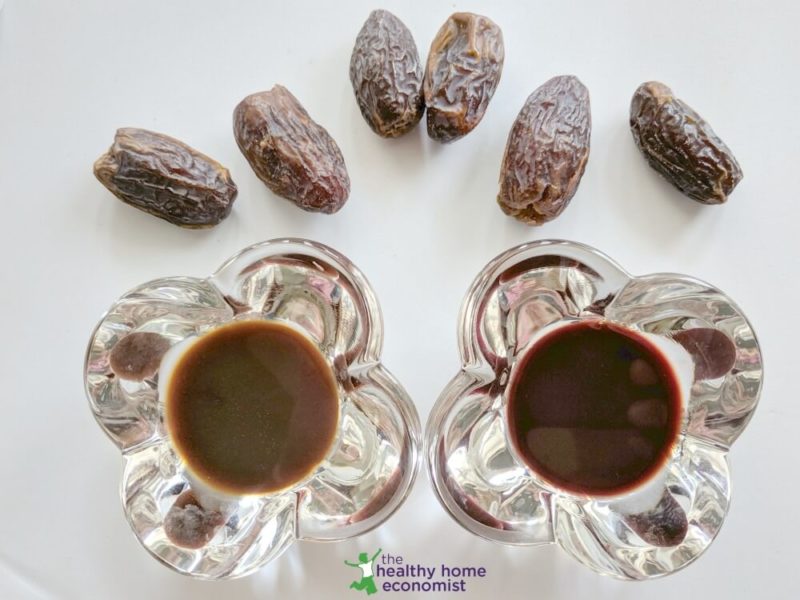Comparison of Middle Eastern and California date syrup in color, taste, and consistency to best determine which is the optimal choice for all your culinary needs.
I consider myself a bit of a date syrup connoisseur.
In the spring when the pollen is thick, it is the only sweetener I use (besides local raw honey, which helps some people with seasonal allergies).
Any other whole food sweetener, including maple syrup and coconut sugar, are problematic because they are disaccharides. This means that they are more difficult to digest, and thus have the potential to trigger an inflammatory response and produce symptoms for a myriad of conditions.
Yes, even in tiny amounts!
For this reason, autoimmune healing diets like GAPS and SCD exclude them from the list of allowable foods (AIP protocol head scratchingly allows them).
Like many people, my immune system tends to overreact to oak tree pollen in the Spring. To manage without symptoms, I avoid all disaccharides (which includes all grains) temporarily. However, since date syrup is a monosaccharide (like honey and fruit), I am able to enjoy it!
Don’t miss my point here. I am not telling you this to dump on whole food disaccharide sweeteners. I have zero issues with them. They are traditional and wonderful to stimulate our natural sweet taste on occasion.
It’s just that in the Spring, my immune system is very sensitive from the oak trees blooming. And, where I live happens to be one of the worst places on the planet for this type of pollen!
So, to avoid any issues, I switch 100% to date syrup for a few weeks until the air clears – literally!
Easy solution and a lot better than taking medication, wouldn’t you agree?
Types of Date Syrup
Because I have used a lot of date syrup over the years, I have noticed that syrups sourced from different geographical areas have a slightly different taste, color, and consistency.
Traditionally, dates are a very important food in Middle Eastern cuisine and culture. They also grow best in a dry environment.
It is no surprise, then, that most of the dates, date sugar and date syrup in the world come from Egypt, Iran, Saudi Arabia, and Iraq. In fact, all top ten countries producing date related foods are part of what’s known as “The Greater Middle East”. This area stretches from Morocco in the west to Pakistan in the east. (1)
The first brands of date syrup I tried years ago came from this part of the world. As its popularity spread, producers emerged elsewhere, most notably in California.
Here are the differences between the two types of date syrup if you are trying to decide which to try and use for recipes and baking.
Imported Date Syrup
Date syrup produced in the Greater Middle East is noticeably thicker than North American date syrup.
This is due to the traditional processing methods which do not completely break down the pectin in the dates. Those of you who make jams and jellies know that adding pectin during the canning process thickens it up.
Same concept when making date syrup except that the pectin is already there and is simply not broken down.
With regard to color, Middle Eastern date syrup is darker. Take a look at the picture above. Can you see the difference? The Tunisian date syrup on the right is quite a bit darker, especially around the edges.
It looks very much like traditionally made cane syrup in fact. No surprise, then, that the flavor of date syrup from this part of the world has subtle overtones of brown sugar.
North American Date Syrup
Date syrup grown and produced in North America is quite a bit different than Middle Eastern versions.
First of all, it is less viscous. This is due to a slower production process which breaks down the natural pectins more completely.
When I first tried it, I didn’t know that it would be so much thinner. As a result, I accidentally dispensed too much for the recipe I was making because it poured so quickly!
While Middle Eastern date syrup is reminiscent of brown sugar, North American date syrup tastes more like homemade butterscotch. Do you see the distinct amber color around the edges of the California date syrup in the photo above? The different growing conditions give it this very unique flavor profile!
The color is correspondingly lighter as well. This is the brand I use.
Middle Eastern or North American Date Syrup. Which is Best?
Having tried date syrups from around the world, I recommend that you try them both first. Blend in your favorite smoothie recipes and healthy desserts and make the call based on the flavor profile your family enjoys most!
I keep both North American and imported date syrup in my pantry. I like the California date syrup for smoothies. For baking, I prefer the Middle Eastern date syrup.
They both cost about the same per serving, so this is one situation where you can choose based on what you truly like best!
Just be sure that whatever brand you choose has no additives and only a single ingredient – organic dates!








Hi Sarah,
I’ve not long started using date syrup. My first was an organic syrup which was dark and rich. I then tried another brand which said it was 73% dates and the colour was much lighter. Do you know what the other 27% could be? Is it cut with sugar syrup?
Many thanks..
If it was 73% dates, then it wasn’t pure date syrup. No idea what it might have been diluted with. I only recommend pure 100% date syrup.
I’ve been using Just Dates Syrup for about 2 years when I make coffee, as I wanted to stop using refrigerated flavored creamers containing carrageenan. I add it to the bottom of the pot and brew as usual. I was just notified that my subscription was cancelled because it is no longer available.
Which brand would you recommend I buy now for use in my coffee pot? I don’t bake nor make smoothies.
Thanks for your help!
Thank you Sarah, I hope you don’t mind if I share the link to this page on my Naturopathic page. I share anything and everything (that which makes sense, lol) in case someone has the same issues and it may help them. Love your blog and glad I subscribed. <3
Of course … I am honored that you would share my findings with others. Best Wishes, Sarah
Hi Sarah!
I love your blog!
I love to research and write about health and wellness as it has always been a passion of mine. I would love to help you and research and write for your blog if you are interested.